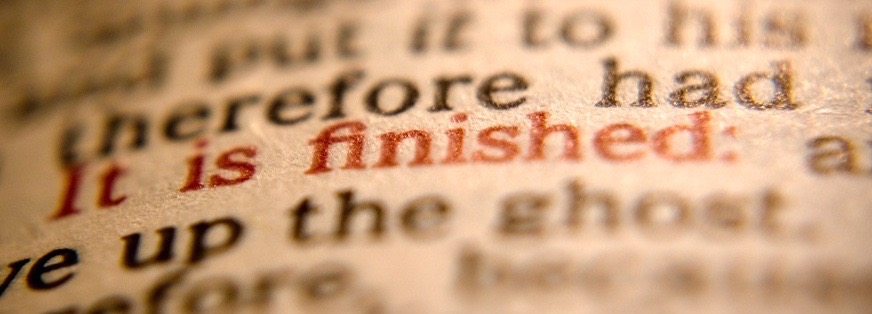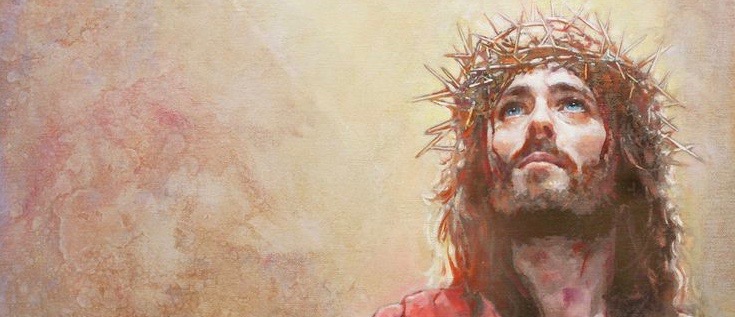 Easter reminds us that we are part of a much larger story. And the Monday after Easter reminds us that it is still finished. For a pastor, the day after Easter is always a kind of let down. We work hard through the Easter season and we put a lot into the weekend. The Monday after Easter is real life. It’s where the reality of the resurrection is meant to be lived out, in the every day stuff of life. This is where we prove that we have joined the redemptive story of God.
Easter reminds us that we are part of a much larger story. And the Monday after Easter reminds us that it is still finished. For a pastor, the day after Easter is always a kind of let down. We work hard through the Easter season and we put a lot into the weekend. The Monday after Easter is real life. It’s where the reality of the resurrection is meant to be lived out, in the every day stuff of life. This is where we prove that we have joined the redemptive story of God.
Surely history is His story. The cross and the resurrection of Jesus is the epicenter of all history. He is the singular figure who split history into B.C. and A.D. and through the lens of Easter Sunday, everything makes sense. And without it, nothing makes sense.
But the day after Easter is a good day to ask: Is His story my story? Has the story of the cross and resurrection become your story? The way this happens is the same way it has always has: The cross precedes resurrection. Brokenness precedes blessedness. Death precedes life.
“When Jesus had received the sour wine, He said, ‘It is finished,’ and He bowed His head and gave up His spirit.” John 19:30 This final cry of Jesus is three words in English but it is one word in Greek: τετέλεσται. It means to bring to perfect completion, finished, accomplished, even paid in full. This is arguably the greatest word ever spoken. Notice, He doesn’t say, “I am finished”, which would be a cry of defeat; but, “It is finished”, which is a cry of victory.
What did He finish? Has it become your story?
- He finished the perfect life. In the garden the night before His crucifixion:
“I glorified you on earth, having finished the work that you gave me to do.” John 17:4 He’s referring to His perfect life- lived as a substitute for us. Just as central to your salvation as the cross, is the fact that Jesus lived the perfect life for you.
- He finished the payment for our sin. He paid the price. The word tetelestai was written over a debt, meaning “paid in full”.
“He is the propitiation (atoning sacrifice, payment) for our sins, and not for ours only but also for the sins of the whole world.” 1 John 2:2. God forgives you only because Jesus has paid the price for your sin.
“For the wages of sin is death, but the free gift of God is eternal life in Christ Jesus our Lord.” Romans 6:23 And because He finished the wage (payment) for your sin…
- He finished the punishment for sin. God will never be angry with you again.
“There is therefore now no condemnation for those who are in Christ Jesus.”
Romans 8:1 He finished the just punishment that was due us. People say, “Well, God loves us so He forgives us.” No, He does not forgive us simply because He loves us. God forgives sin only because Christ took on the wrath of God toward sin. God is loving yes, and His love is just. His justice is loving.
- He finished the need for religion. Many people are surprised by this.
“Do not think that I have come to abolish the Law or the Prophets; I have not come to abolish them but to fulfill them.” Matthew 5:17 Jesus fulfilled all of the crushing demands of God’s holiness, through His sinless life. Many of us are trying to finish something that has already been completed. In Matthew 27:51 it says that right after Jesus cried out “Tetelestai”, the giant veil in the Temple- that separated the Holy of Holies (the presence of God) from the rest of the Temple- was torn in two. The barrier between us and God (the religion of man and a Holy God) was torn apart. And it says, from the from top to bottom. It was from heaven down. Not man to God, but God to man, opening up the Way, destroying all of our religious self-salvation projects.
“For God has done what the law, (religion) weakened by the flesh, could not do. By sending His own Son in the likeness of sinful flesh and for sin, He condemned sin in the flesh.” Romans 8:3 People say Christianity is not about religion, but a relationship. This is not the full truth. Everyone has a relationship with God already. You are either a condemned sinner before a Holy God or you are an adopted son or daughter before your Loving Father. It’s one or the other. Religion says you must do certain things for God to seek His approval. But in Christ it is done.
- He finished the pathway to eternal life.
Jesus said to him, “I am the way, and the truth, and the life. No one comes to the Father except through me. John 14:6
So that’s it. Has IT become your story? Is His story your story? He finished all that is necessary for us to experience LIFE. But like every great story, there’s a twist:
It is – This cry is in the present perfect tense which describes an action that was fully completed in the past and its effects are being felt in the present. Jesus could have used the aorist tense and simply said, “the work is done”. The resurrection means that it is present tense. His story continues as we receive what He’s done for us. His resurrection becomes ours- it is the turning point of history and it is the turning point of your life, when His story becomes your story. Is His story your story?
It – all that’s necessary for salvation… is – present tense, now… finished.
The big story of God’s redemption has now shifted. In the Old Testament priests were not allowed to sit when they were on duty, symbolic of the fact that their work was never finished. This is the religious life. You’re never finished.
“But when Christ had offered for all time a single sacrifice for sins, He sat down at the right hand of God.” Hebrews 10:12 The Priest became the Lamb. The High Priest sacrificed Himself, and then He sat down. And through the lens of Easter Sunday, everything makes sense. This is present tense.
Is His story your story?
His story becomes your story WHEN you surrender your life to Him and receive His finished work on your behalf. The Cross precedes Resurrection. Death precedes life. You must surrender your life to Him. You must give up trying to finish it.
When you discover that Jesus has finished what matters most you realize that all that matters is finished. Your unending need for love is finished. Your need for purpose is finished. Your need for assurance is finished. Your need for forgiveness is finished. Your constant need for more is finished in Him- more money, more worth, more power, more affirmation, more applause, more happiness- all is finished. More will never be enough until you find that Jesus has finished everything for you.
If you could summarize Christianity in one word, it would be tetelestai. Only in Christ do you find rest, because only in HIM is it finished.
When Buddha died, his last words were, “Strive without ceasing… never stop striving.” But the last words of Jesus are, “STOP striving; I have done all the striving necessary.”
Religion says, “finish the work”, but the Gospel says, “Receive the finished work.” Rest in Him. But His story is not finished until it is finished in you. Luke 9:23, Jesus says, “If anyone will come after me, he must deny himself, take up his cross daily, and follow me.” This is the story we find ourselves in. Is His story your story?
Is His story your story? His story becomes your story when you surrender your life to Him and receive His finished work on your behalf.
IT. IS. FINISHED.



 Thursday night before His death
Thursday night before His death

